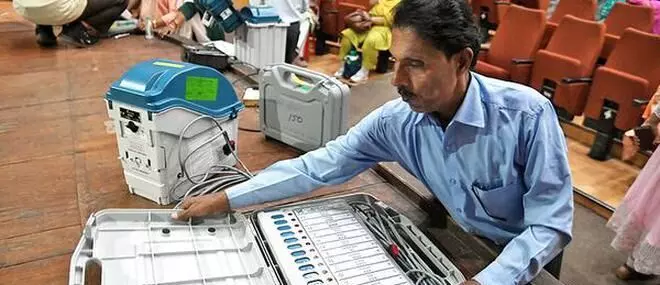
EVMs accurate unless maligned by human bias, says SC
text_fieldsPoll officials assemble EVMs and VVPAT machines during their training for the LS polls. | Photo: The Hindu
New Delhi: The Supreme Court said on Tuesday that machines provide “absolutely accurate results” unless human bias taints them, rejecting the idea of going back to paper ballots in an effort to restore the “little man’s” faith in the election process.
“Human weaknesses, including bias, may lead to a problem. Machines without human intervention would give absolutely accurate results,” Justice Sanjiv Khanna, heading a two-judge Bench, observed.
The testing of the "actual performance" of electronic voting machines (EVMs) was permitted by the court. It stated that the Election Commission's data should be the exclusive basis for the assessment and that opinions from other sources, such as surveys regarding EVMs, should not be included, The Hindu reported.
The hearing was scheduled by the court for this coming Thursday, April 18, the night before the Lok Sabha election's first phase.
The concept of going back to paper ballots was peremptorily rejected by the Bench, which also included Justice Dipankar Datta.
“We are in our sixties… We have seen in our lives what happened when it was ballot papers. We have seen the drawbacks of the past,” Justice Khanna said.
The Association for Democratic Reforms (ADR) and Arun Kumar Agarwal filed separate petitions in court emphasising a voter's fundamental right to know the results of his vote.
The petitioner made it clear that they did not believe the EVMs were malicious. The EVM system's failure to give voters confidence or confirmation regarding their ballots was their only issue. A button served as the only interface for the voters. They had no way of knowing if their votes had been appropriately recorded by the system. The voter-verifiable paper audit trail, or VVPAT, equipment displayed the slip for a mere seven seconds following the vote.
“I am not talking about the urbane voter in this courtroom. I am talking about the queues of multitudes who are hustled into the polling booths to press a button and hustled out, not knowing what really happened. Leaving aside the foibles about the past regarding ballot papers, that system had at least given the little man confidence that he had put his little cross across the right party symbol,” senior advocate Gopal Sankaranarayanan, for Mr. Agarwal, submitted.
“I am unable to confirm my vote. My physical contact with my vote has gone completely,” Mr. Sankaranarayanan said.
Prashant Bhushan, an advocate, claimed that voters exit the booth without any sense of accuracy.
Reverting to paper ballots, providing voters with VVPAT paper slips to insert into the ballot box, or making the VVPAT screens transparent glass instead of opaque, as they currently are, were the three possibilities put out by Mr Bhushan.
Additionally, the petitioners are requesting a 100% cross-verification of the VVPAT slips and the EVM vote total. Even though the government had paid around ₹5,000 crore to buy almost 24 lakh VVPATs, they claimed that only about 20,000 of the slips from those machines could be verified.
The top court's 2013 ruling in Subramanian Swamy v. Election Commission of India, which said that the election process should "have fullest transparency in the system and to restore the confidence of the voters," was cited by them
Mr Bhushan pointed out that other European nations, such as Germany, had returned to using paper votes.
Judge Datta stated that while there are six crore people living in Germany, there are 98 crore registered voters in India.
“This [elections in India] is a humongous task. My home State, West Bengal, is more populated than Germany. You have to repose some trust in somebody. Of course they [Election Commission] are accountable... Some dotting of the ‘i’ and ticking of the ‘t’ can happen, but do not try to bring down the system,” Justice Datta told the petitioners.
The "very high chance of errors" in the EVMs, according to Mr Sankaranarayanan, was what worried him more than the population.
Judge Khanna stated that candidates could use their right to challenge any inconsistency between the total number of votes cast and the votes counted.
“If we are to look into whether EVMs are functioning well, we have to go by data. We need data on the number of votes polled and the number counted. Any discrepancies in the past. How much discrepancy was there. On how many instances candidates requested counting… They (Election Commission) can provide the data,” Justice Khanna said.





















